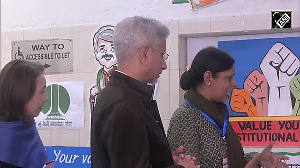What is economic freedom? How does one measure or quantify it? What is the link between social freedom, political freedom and economic freedom? In the long run, is the last sustainable without the others, and is there a conflict between these objectives? These are major questions that give rise to debate.
However, in cross-country analyses, the consensus that has emerged is on the notion of economic freedom. There are four basic propositions. First, the more an economic agent's freedom of choice, the better it is.
Second, legal structures that settle disputes faster and protect property rights are superior to the alternatives.
Third, the less the government controls, the better. And finally, the lower the government's share in the economy, the more free the country is economically.
Tamil Nadu: Best place to do business
The broad thrust of Indian opinion accepts the first and second propositions, but not necessarily the third and fourth. However, the third and the fourth happen to be key objectives of India's reform exercise.
In that sense, the more the reforms proceed, the freer India becomes economically - though today's political climate is in favour of restricting economic freedoms in order to enhance social freedom.
While cross-country rankings on economic freedom have become routine, sub-national and inter-regional rankings are rarer.
The United States, Canada, China and India seem to be the only countries that have attempted such sub-national rankings. It is a moot point whether economic freedom is best captured through perceptions or objective data. The former may be perceived to be more realistic, but is inherently subjective. The latter don't suffer from perceptional biases, but are constrained by the availability of hard data.
The Debroy-Bhandari Economic Freedom Rating of States 2005 relies on the official data, as opposed to questionnaires, and can always be questioned on the grounds that all variables concerning economic freedom haven't been included. Having said this, does the study have any utility in telling us what is happening across India's states?
The key question is of course convergence or divergence across India's states, and this is not just a matter of looking at income levels. For example, gross enrolment rates show convergence, but infant mortality rates show divergence.
Indeed, many variables used in this study are no different from the variables one would use in measuring governance; and the study tells us that governance (or economic freedom) is improving in some states, but deteriorating in others. Some states have not only fallen in ranking but also in absolute scores.
In general, South India performs better, with Tamil Nadu heading the list. But Haryana from the North figures near the top, as does Gujarat from the West. If anything, the mis-governance problem is concentrated in the East, and this does not mean just UP or Bihar.
Compared to the 2004 rankings, there has been little change in the size of government. Improvements are primarily due to changes in the legal structure and regulation.
The 2004 study generated a lot of controversy. One hopes that story will not be repeated this time. Because, independent of rankings, the citizen's objective function is to increase economic freedom and improve governance.
Last year, the study had a correlation between economic freedom and migration. Above a minimum threshold level of income, there is greater out-migration from states that are economically un-free and greater in-migration into states that are free.
However, migration cannot be a general solution. What other pressure can citizens bring on states to reform?
Unfortunately, last year, both the BJP and the Congress used the study to play politics and that may recur this year also. And that's the reason why most states aren't changing in the way they should.






 © 2025
© 2025